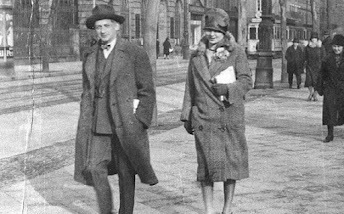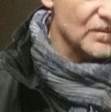Joseph Roth's writing techniques - from what already is into what is coming

I recently started reading Joseph Roth, his famous novel "Radetzkymarsch".
There is a way of his writing style, a sophisticated technique, that struck me.
We observe a starting point, from a focalized close object, which opens the field where the object is situated, and then enlarges towards more ample horizons where the thought is going to resonate in a fading step by step. When the resonance has almost faded, the descriptive action of the resonating starting point ends in a logical but turning point resolution.
A technique which I would resume in moving from what already is into what is coming
Sump up.
After being wounded in battle, saving the emperor's life, Lieutenant Joseph Trotta was appointed captain and granted the noble title by the emperor himself. After his recovery, the Lieutenant tries to return to everyday life as before. Here starts a long tracking shot backwards, from a close-up of his face reflected in the mirror, the thoughts widen up to a point as to involve his entire life until they end the tracking shot by narrowing down to the relationship with his father on whom the resolution focuses and the entire descriptive procedure ends
Let's check the first example.
"Every night before retiring and every morning upon awakening, as if his own life had been traded for a new and alien life manufactured in a workshop, he would repeat his new rank and his new status to himself and walk up to the mirror to confirm that his face was the same. Despite the awkward heartiness of army brethren trying to bridge the gulf left by a sudden and incomprehensible destiny, and in spite of his own vain efforts to encounter everyone as unabashedly as ever, the ennobled Captain Trotta seemed to be losing his equilibrium; he felt he had been sentenced to wear another man’s boots for life and walk across a slippery ground, pursued by secret talking and awaited by shy glances...
To the son of a noncommissioned officer, the rank of an ordinary infantry lieutenant had seemed natural and suitable. But to the decorated, aristocratic captain, who went about in the alien and almost unearthly radiance of imperial favor as in a golden cloud, his own father had suddenly moved far away, and the measured love that the offspring showed the old man seemed to require an altered conduct and a new way for father and son to deal with each other... [the] letters to his father, on yellowish and pulpy octavo, resembled one another like furlough orders and regulation forms. After the salutation Dear Father at the left, four fingers from the top and two from the side, they began with the terse news of the writer’s good health, continued with his
More evident this technique is in the second example. Movement from nightly shadows to the resolution to visit the father.
" On that silent evening when, for the first time since his recovery, Captain Trotta, in order to perform the correspondence duty, sat down at the table, which was lavishly carved up and notched over by the playful knives of bored men, he realized he would never get beyond the salutation Dear Father. Leaning the barren pen against the inkwell, he twisted off the tip of the wick on the guttering candle as if hoping for a happy inspiration and an appropriate phrase from its soothing light, and he gently rambled off into memories of childhood, village, mother, and military school. He gazed at the gigantic shadows cast by small objects upon the bare blue lime-washed walls, at the slightly curved, shimmering outline of the saber on the hook by the door, and, tucked into the saber guard, at the dark neckband. He listened to the tireless rain outside and its drumming chant on the tin-plated windowsill. And he finally stood up, having resolved to visit his father the week after the prescribed thank-you audience with the Kaiser, for which he would be detailed during the next few days."
------------------------------
The English translations are by JOACHIM NEUGROSCHEL
Follow me on Substack

Published on April 23, 2023 11:44
No comments have been added yet.



